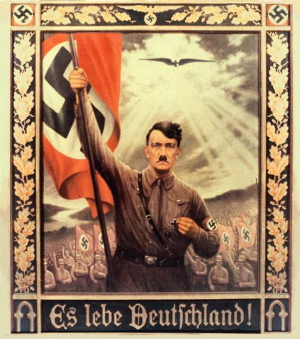 There are many people who think that there was some kind of uniquely German gene that made millions succumb to Hitler. But if, as I did, these people had the chance to meet Karl Boehm-Tettlebach, who worked for Hitler as a Luftwaffe attaché during the war, then their minds would be changed.
There are many people who think that there was some kind of uniquely German gene that made millions succumb to Hitler. But if, as I did, these people had the chance to meet Karl Boehm-Tettlebach, who worked for Hitler as a Luftwaffe attaché during the war, then their minds would be changed.
Karl Boehm-Tettlebach was as much American as he was German. His mother was from Oregon, his father from the Rhineland, and he spoke perfect English, tinged with an American accent. Yet this half-American man found Hitler “impressive.” Moreover, he told me that he believed Hitler was “a respectable person. Charming as a host, not wild and shouting…. He was very friendly…, normal.” He was particularly struck by Hitler’s ability to dominate a meeting: “I never heard a conference where he did not win [the argument]. Years ago, when he started out, he had a computer memory, and if he heard something, or knew something, he registered that in his computer. So then if he saw somebody after a year he said, ‘But then, last year, you said something else. You said you needed more steel—do you have enough steel?’”
Even when it was clear that Germany was losing the war, Boehm-Tettlebach marveled at Hitler’s ability to inspire. In the summer of 1944, Boehm-Tettlebach escorted a German field marshal into the Wolf’s Lair, Hitler’s military headquarters in East Prussia. The field marshal told Boehm-Tettlebach that he was going to give Hitler “hell.” Hitler, the field marshal said, “should know what’s going on in France” and, according to Boehm-Tettlebach, he found some “nasty” words to criticize Hitler. Half an hour later, the field marshal emerged from Hitler’s presence and said, “Boehm, excuse me. I was mad today, but I made a mistake. Hitler convinced me that I’m wrong. I didn’t know what he knows. So therefore I feel sorry.”
“He showed up angry and left enthusiastic and flabbergasted,” Boehm-Tettlebach told me. “Very strange. But the flair Hitler had was unusual. He could [take] somebody who was ready for suicide, he could revive him and make him feel that he should carry the flag and die in battle. Very strange.”
How can we understand why an intelligent man like Boehm-Tettlebach respected Hitler as he did? In part, he was grateful to Hitler for leading Germany out of recession, putting millions back to work, and restoring national pride. As for the persecution of the Jews and the horror of the concentration camps, Boehm-Tettlebach preferred to turn a blind eye to the atrocities of the regime and, as a young Luftwaffe officer, go to dances instead. More than anything, though, over time Boehm-Tettlebach simply came to set aside his rational judgment and put his trust in Hitler. Life can be much easier, Boehm-Tettlebach discovered, when you have faith in a strong leader who is certain about the right way forward.
But, of course, it’s a strategy that can go badly wrong—spectacularly so in Boehm-Tettlebach’s case. When I met him, in the 1990s, he still struggled to understand how he could have so misjudged Hitler. “Strange that a person can show up and talk to me, like you’re talking to me,” he said, “and suddenly I hear that he killed three people at night. This is something you can’t grasp. This is extraordinary. This is outstanding. It’s something unusual, very unusual. Well, it’s the same as the French Revolution. You know the people in the French Revolution, the leaders there? They wanted to do something good and ended up killing the people.”
After the war, Karl Boehm-Tettlebach had a happy and successful career working for Pan Am Airways. I asked him if his experience had taught him any life lessons. He said this about Hitler: “I met him as a normal man, and at the very end, when he was dead, he was a horrible man…. So therefore you have to judge someone very thoroughly before you throw your life into his lap.”




